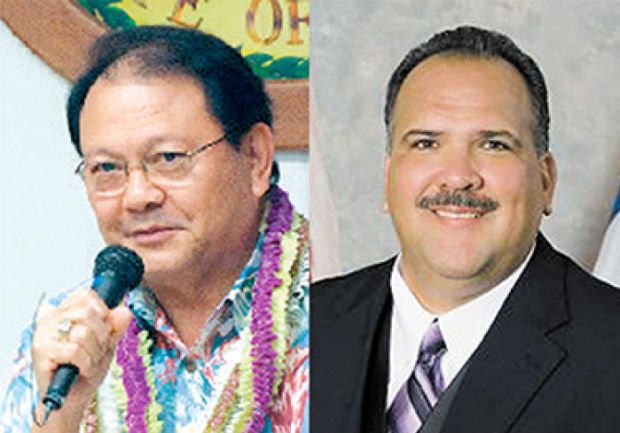LIHUE — A round of Kauai County furloughs, imposed in response to the lingering economic crisis in 2010, may not have been necessary and was not planned or executed as well as it could have been, according to a county auditor’s report released Tuesday.
The audit, performed by PKF Pacific Hawaii LLP, found that the county’s furlough program, which closed county offices for two days a month from July 1 to Dec. 31, 2010, “was effective but could have been more efficient if the county had followed best practices.”
County Auditor Ernesto Pasion said in a statement that the 36-page audit “revealed deficiencies in planning and a lack of transparency and accountability in the execution of the furlough program.”
“I was also troubled that the furlough program was not monitored and favoritism may have been allowed to occur,” Pasion said.
But Mayor Bernard Carvalho Jr., who was in office when the furlough program was carried out, decried Pasion’s allegations, which were outlined in a press release accompanying the audit report.
Carvalho said his administration viewed a draft version of the audit report, which “we felt it was well-presented and included findings with which we largely agreed.”
Though the final report mirrors a version of the audit, Carvalho said, “the auditor’s press release politicizes and distorts a perfectly clear and useful report.”
“There are issues raised in the press release that were not included in the draft report, and therefore, we had no opportunity to comment on them prior to the audit being finalized,” Carvalho wrote. “Furthermore, the auditor’s release contains inaccurate statements and inflammatory comments that are not consistent with the audit findings.”
Falling short
The county, according to the audit, realized salary savings by implementing the furlough program even though “the savings could have been better if the county monitored and set clear objectives for the furlough program.”
The furloughs, according to the audit, saved $1.5 million in salary costs but fell slightly short of the $1.6 million that county officials had expected to save.
The report found that seven county departments realized savings during the furlough, including the Kauai Civil Defense Agency, Office of Economic Development, Agency on Elder Affairs, Kauai Housing Agency, Kauai Police Department, Department of Public Works and Transportation Agency.
Ten other departments, however, fell short of meeting cost-saving goals, including the Office of the County Attorney, Department of Finance, Kauai Fire Department, Department of Liquor Control, Office of the Mayor, Department of Parks and Recreation, Personnel Services, Planning Department, and Office of the Prosecuting Attorney.
The audit also found that county officials withheld too much money from 49 county employees who worked 10-hour shifts — 37 of whom worked in the Department of Public Works. Though the formula to calculate withholding amounts was correct for employees working eight-hour shifts, the audit found that it also “resulted in less pay when applied to employees working 10-hour shifts.”
Including more human resource staff from individual departments, the report read, “could have helped to avoid the errors.”
“If the audit had not occurred, these employees would not know that too much was taken out of their pay,” Pasion said. “We let the administrative and legislative branches know about the errors, but no action is being taken. Responsible management should address the errors.”
Points of contention
Though county officials in 2010 said the furlough program was needed to address the county’s financial difficulties, Pasion said he questions whether it was necessary at all.
Pasion, in his press release, claimed that financial need was not analyzed and the county had an unappropriated surplus of $58,614,000.
Carvalho disagreed and said the county’s certified annual financial report for fiscal year 2009, which is commissioned by the auditor, shows a $32.8 million unassigned fund balance, and that all other funds of the county were either committed, assigned or restricted.
Carvalho said the purpose of the audit was to assess the financial impact of the furlough program, and to determine if the county planned and managed the furlough program effectively and efficiently.
The audit notes that all but one deputy county attorney received a raise just prior to the furlough. The remaining attorney was already making more than level set for the position by the salary commission, Pasion states.
“It is unthinkable that while the pay of most county employees was cut, all but one of the deputy county attorneys received pay raises to the maximum salary level just before the furlough started,” Pasion said.
Carvalho, however, disagreed and said the salaries were not raised to maximum levels and no one was above Salary Commission limits.
“Raising new issues in the press release that were not dealt with in the audit after the fact is puzzling and disturbing, and distracts from an otherwise useful audit,” Carvalho said.
The pay of water safety officers, lifeguards, police dispatchers and a public safety officer was cut only 5 percent, Pasion said, while these groups also received five extra days of paid leave — a benefit not available to other employees.
“This kind of preferential treatment would not have been exposed without the audit,” Pasion wrote.
Pasion and Carvalho have a history of contention. Pasion conducted a gas audit on the county a couple of years ago that said the mayor had used a county fuel card inappropriately. The County Council has held several executive sessions regarding the auditor’s office. Pasion, meanwhile, has since filed a lawsuit against the county, claiming the county has retaliated against him since he issued that audit.
Carvalho, however, said those employees “were treated differently than other employees by all jurisdictions because of the nature of their jobs.”
“Furloughing these workers for two days a month would have compromised health and safety to an unacceptable degree, so an alternate plan was devised for them and agreed to by their respective unions,” Pasion wrote.
The audit reports that the police and fire chiefs, and other public safety positions were not subject to the furlough because of previously negotiated collective bargaining agreements.




